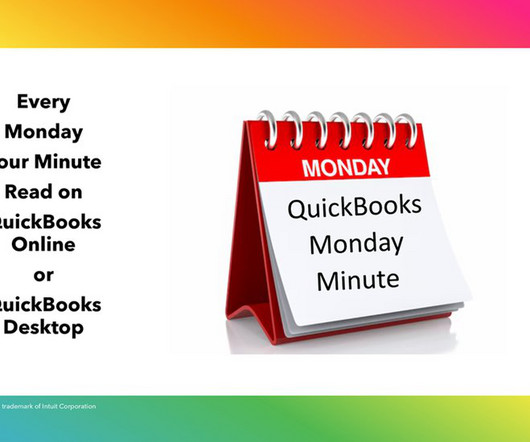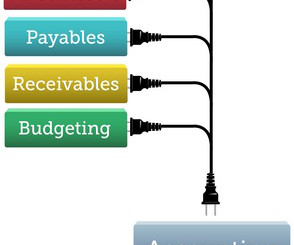QuickBooks Hosts Accountants for Ecosystem Care Jam
Insightful Accountant
JUNE 2, 2024
QuickBooks recently hosted an Ecosystem Care Jam for accountants involving more than 300 QuickBooks employees from around the world.

Insightful Accountant
JUNE 2, 2024
QuickBooks recently hosted an Ecosystem Care Jam for accountants involving more than 300 QuickBooks employees from around the world.

Bookkeeping Essentials
JUNE 2, 2024
Learn why it matters that you understand your balance sheet. Then discover what it reveals about your business finances. The mystery is about to unfold!
This site is protected by reCAPTCHA and the Google Privacy Policy and Terms of Service apply.

Future Firm
JUNE 2, 2024
Learn the steps on how to hire an awesome virtual assistant for CPAs and why they're a game changer for your business. The post The Ultimate Virtual Assistant for CPAs Guide appeared first on Future Firm.

Bookkeeping Essentials
JUNE 2, 2024
An introduction to learning how to read your financial statements and evaluate the information to uncover your business's financial health, problems, and potential outlook.

Speaker: Dave Sackett
Traditional budgeting and forecasting methods can no longer keep pace with today’s rapidly evolving business environment. Static budgets, rigid annual forecasts, and outdated financial models limit an organization’s ability to adapt to market shifts and economic uncertainty. To stay ahead, finance leaders must leverage a future-forward approach—one that leverages real-time data, predictive analytics, and continuous planning to drive smarter financial decisions.

IMA's Count Me
JUNE 2, 2024
Join host Adam Larson as he chats with Jeremy Bryant on the Count Me In Podcast in a refreshing and insightful conversation. Hear about Jeremy's inspiring journey from accounting to entrepreneurship, real estate, and his latest venture, No Story Lost. Get ready for engaging stories and valuable insights straight from the guest himself. Count me in listeners can receive a special discount by going to nostorylost.com and entering the code Podcast2024 for 2 free books.

Bookkeeping Essentials
JUNE 2, 2024
Learn why it matters that you understand your income statement. Then discover what it reveals about your business finances. The mystery unfolds!
Financial Ops World brings together the best financial operations content from the widest variety of thought leaders.

Bookkeeping Essentials
JUNE 2, 2024
Developing management skills in the art of supervising your bookkeeper lets you stay in control of your money.

Accounting Tools
JUNE 2, 2024
What is a Trading Account? A trading account is an investment account. It contains the cash and securities holdings of an investor. Trading accounts are commonly used by day traders to buy and sell securities, and so tend to experience high transaction volumes. An investor may employ several of these accounts, each for a different purpose. For example, one account may be used for trades related to a pension, while another is used for general investment purposes.

Bookkeeping Essentials
JUNE 2, 2024
Basic cash management is a barometer of your business’ health. If you have cash flowing in and out of your business, you can keep the doors open for business.

Accounting Tools
JUNE 2, 2024
What are Timing Differences? Timing differences are the intervals between when revenues and expenses are reported for financial statement and income tax reporting purposes. When there are timing differences, the amount of reported taxable income could vary significantly from the amount reported on the income statement. Over a period of time, these timing differences will even out, though they may be replaced by a new set of timing differences.

Speaker: Erroll Amacker
As businesses increasingly adopt automation, finance leaders must navigate the delicate balance between technology and human expertise. This webinar explores the critical role of human oversight in accounts payable (AP) automation and how a people-centric approach can drive better financial performance. Join us for an insightful discussion on how integrating human expertise into automated workflows enhances decision-making, reduces fraud risks, strengthens vendor relationships, and accelerates R

Bookkeeping Essentials
JUNE 2, 2024
Free accounting training for home-based business owners on how to read your internal financial statements. Non-accountants only!

Accounting Tools
JUNE 2, 2024
What is Turnover? Turnover is the rate at which an asset is replaced during a measurement period. The term is most commonly used in accounting, and refers primarily to the turnover of accounts receivable , inventory , and accounts payable - which are the components of working capital. A high level of receivables and inventory turnover is considered to be good, since a business is avoiding old receivables and the risk of obsolete inventory.

Accounting Tools
JUNE 2, 2024
What is Total Quality Management? Total quality management (TQM) refers to the ongoing reduction of process errors and the streamlining of operations. The result is a system that contains few non value-added elements, and which produces results with minimal error rates. These results are gauged from the viewpoint of the customer. A common outcome of a TQM system is increased profits , because a business spends less time and money correcting errors.

Accounting Tools
JUNE 2, 2024
What is Total Variable Cost? Total variable cost is the aggregate amount of all variable costs associated with the cost of goods sold in a reporting period. It is a key component in the analysis of corporate profitability. The components of total variable cost are only those costs that vary in relation to production or sales volume. It is not compiled at the individual unit level.

Advertisement
Based off SkyStem's popular e-Book, the book of secrets to the month-end close will be revealed in this one-hour webinar. Learn leading practices when it comes to building a strong and sustainable month-end close that has room to grow and evolve. Learn about the power of precise estimates, why reconciliations are critical to closing the books, how and when to automate, and how the chart of accounts play into your close process.

Accounting Tools
JUNE 2, 2024
What are Taxes Payable? Taxes payable refers to one or more liability accounts that contain the current balance of taxes owed to government entities. Once these taxes are paid, they are removed from the taxes payable account with a debit. Many taxes payable are paid within a short period of time, and so do not remain on an organization’s balance sheet for long.

Accounting Tools
JUNE 2, 2024
What is a Trading Profit? A trading profit has two definitions, involving investments and operations. They are defined below. Investment Trading Profits The earnings achieved by someone who invests in short-term securities. Because of the short (less than one year) holding period of these investments , trading profits are taxed at the higher ordinary income tax rate, rather than the lower long-term capital gains rate that is allowed for investments that someone has held for at least one year.

Accounting Tools
JUNE 2, 2024
What is Treasury Stock? Treasury stock is shares in a company that the issuer has reacquired. The issuing company may then retire the stock or resell it at a later date. When calculating the number of shares issued and outstanding, which are reported in a company's financial statements , treasury stock is classified as issued, but it is not outstanding.

Accounting Tools
JUNE 2, 2024
Target income is the profit that the managers of a company expect to attain for a designated accounting period. It is a key concept in a corporate control system that drives corrective management actions. The term is used in the following situations: Target Net Income in Budgeting Managers may structure the expenditures of a business to attain a certain target income.

Speaker: Anna Tiomina, MBA
AI is reshaping industries, yet finance remains one of the slowest adopters. Concerns over compliance, legacy systems, and data silos have made finance teams hesitant to embrace AI-driven transformation. But delaying adoption isn’t just about efficiency—it’s about staying competitive in a rapidly evolving landscape. How can finance leaders overcome these challenges and start leveraging AI effectively?

Accounting Tools
JUNE 2, 2024
What is a Temporary Difference? A temporary difference is the difference between the carrying amount of an asset or liability in the balance sheet and its tax base. A temporary difference can be either of the following: Deductible. A deductible temporary difference is a temporary difference that will yield amounts that can be deducted in the future when determining taxable profit or loss.

Accounting Tools
JUNE 2, 2024
Taxable profit is the profit upon which income taxes are payable. The composition of taxable profit varies by taxation authority, so it will vary depending upon the rules of the taxation authorities within which an entity is located or does business. For instance, a government may declare that certain qualifying organizations have nonprofit status, so that any of their qualifying earnings are not subject to income tax.

Accounting Tools
JUNE 2, 2024
How to Budget for Bonuses Some companies like to budget for bonuses that employees earn if they reach certain performance targets. This presents a budgeting conundrum – what if you budget for a bonus that does not occur, or you elect not to budget for a bonus that does occur? For example, if you budget for a bonus that does not occur, this creates a favorable compensation expense variance, since the company spent less than expected.

Accounting Tools
JUNE 2, 2024
What is Continuous Controls Monitoring? Continuous controls monitoring (CCM) is the use of automated tools to examine business transactions as they occur. A CCM system automatically pulls certain data elements from a database of transactions and reviews all of these data elements. The intent is to conduct a complete scan of the data for control breaches, errors, possible segregation of duties problems, and anomalies from what is expected.

Advertisement
Is your finance team bogged down by endless data requests and disorganized spreadsheets during the month-end close? It’s time to consider a better option – automate with ART! SkyStem’s solution works alongside your ERP to transform the close and account reconciliation process and speed up month-end work. Explore SkyStem’s ART - the award-winning account reconciliation automation platform - and receive a $100 Amazon gift card as a thank you for your time.

Accounting Tools
JUNE 2, 2024
How to Conduct a Self-Audit The internal audit staff is a highly-trained group that can be employed in a variety of value-added tasks, including advising the managers of business units on many process-related topics. However, doing so means that there will be less time available for the more traditional task of control assessments. To ensure that the internal audit staff is employed on the highest-value tasks, it may make sense to shift a portion of the control reviews to the staff of the busine

Accounting Tools
JUNE 2, 2024
The audit department tends to be a free-standing business unit that arrives for scheduled audits , investigates and makes routine recommendations, and then departs for other projects. There is no ongoing communication with the various departments, unless there is an ongoing or upcoming audit project. This lack of communication represents a wasted opportunity, for the audit staff has a broad base of knowledge that it can share with the business unit managers.

Accounting Tools
JUNE 2, 2024
What is an Audit Specialist? An audit specialist is someone trained extensively to conduct specialized tasks within an audit. These people are typically brought into an audit to deal with specific tasks, after which they move on to other audits. Because of the comparatively narrow scope of their work, audit specialists tend to work on more audits than general auditors.

Accounting Tools
JUNE 2, 2024
What is an Auditor Skills Matrix? An auditor skills matrix identifies the applicable skill sets of all auditors employed by a business. This information is used to assign auditors to those audits requiring their specific skills. The background, skills, and experience of auditors can vary substantially. Some may have detailed knowledge of certain accounting software systems, while others may be particularly adept at physical inventory counts, and others have long experience in certain industries.

Speaker: Melissa Hurrington
Finance isn’t just about the numbers. It’s about the people behind them. In a world of constant disruption, resilient finance teams aren’t just operationally efficient. They are adaptable, engaged, and deeply connected to a strong organizational culture. Success lies at the intersection of people, culture, adaptability, and resilience. Finance leaders who master this balance will build teams that thrive through uncertainty and drive long-term business impact.
Let's personalize your content